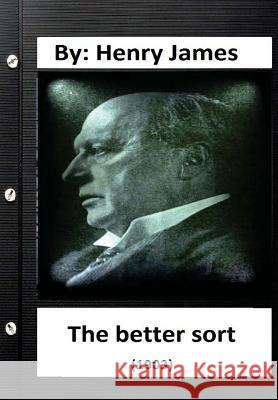The Better Sort (1903) By: Henry James (Original Classics) » książka
The Better Sort (1903) By: Henry James (Original Classics)
ISBN-13: 9781533268310 / Angielski / Miękka / 2016 / 306 str.
The Better Sort (1903) By: Henry James (Original Classics)
ISBN-13: 9781533268310 / Angielski / Miękka / 2016 / 306 str.
(netto: 62,91 VAT: 5%)
Najniższa cena z 30 dni: 65,87
ok. 16-18 dni roboczych
Dostawa w 2026 r.
Darmowa dostawa!
Henry James, OM (15 April 1843 - 28 February 1916) was an American writer. He is regarded as one of the key figures of 19th-century literary realism. He was the son of Henry James, Sr. and the brother of philosopher and psychologist William James and diarist Alice James. He is best known for a number of novels showing Americans encountering Europe and Europeans. His method of writing from a character's point of view allowed him to explore issues related to consciousness and perception, and his style in later works has been compared to impressionist painting. His imaginative use of point of view, interior monologue and unreliable narrators brought a new depth to narrative fiction. James contributed significantly to literary criticism, particularly in his insistence that writers be allowed the greatest possible freedom in presenting their view of the world. James claimed that a text must first and foremost be realistic and contain a representation of life that is recognisable to its readers. Good novels, to James, show life in action and are, most importantly, interesting. In addition to his voluminous works of fiction he published articles and books of travel, biography, autobiography, and criticism, and wrote plays. James alternated between America and Europe for the first twenty years of his life; eventually he settled in England, becoming a British subject in 1915, one year before his death. James was nominated for the Nobel Prize in Literature in 1911, 1912, and 1916.James was born at 2 Washington Place in New York City on 15 April 1843. His parents were Mary Walsh and Henry James, Sr. His father was intelligent, steadfastly congenial, and a lecturer and philosopher who had inherited independent means from his father, an Albany banker and investor. Mary came from a wealthy family long settled in New York City, and her sister Katherine lived with the family for an extended period of time. Henry, Jr. had three brothers, William who was one year his senior and younger brothers Wilkinson and Robertson. His younger sister was Alice. The family first lived in Albany and then moved to Fourteenth Street in New York City when James was still a young boy. His education was calculated by his father to expose him to many influences, primarily scientific and philosophical; it was described as "extraordinarily haphazard and promiscuous." James did not share the usual education in Latin and Greek classics. Between 1855 and 1860, the James' household traveled to London, Paris, Geneva, Boulogne-sur-Mer and Newport, Rhode Island, according to the father's current interests and publishing ventures, retreating to the United States when funds were low. Henry studied primarily with tutors and briefly attended a few schools while the family traveled in Europe. Their longest stays were in France, where Henry began to feel at home and became fluent in French. In 1860 the family returned to Newport. There Henry became a friend of the painter John La Farge, who introduced him to French literature, and in particular, to Balzac. James later called Balzac his "greatest master," and said that he had learned more about the craft of fiction from him than from anyone else. 2] In the autumn of 1861 Henry received an injury, probably to his back, while fighting a fire. This injury, which resurfaced at times throughout his life, made him unfit for military service in the American Civil War.
Zawartość książki może nie spełniać oczekiwań – reklamacje nie obejmują treści, która mogła nie być redakcyjnie ani merytorycznie opracowana.











